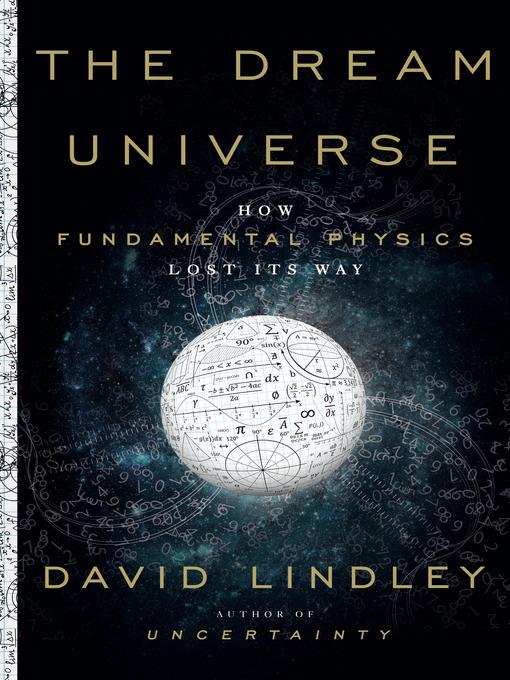
The Dream Universe
How Fundamental Physics Lost Its Way
کتاب های مرتبط
- اطلاعات
- نقد و بررسی
- دیدگاه کاربران
نقد و بررسی

January 6, 2020
Astrophysicist Lindley (Uncertainty) argues that modern physics has drifted too far from its roots in reality, into increasingly complex and abstract theory, in this eye-opening treatise. Setting the stage, he observes that at the start of the Renaissance, scientists placed more weight on orthodox, Church-sanctioned theory, derived from Aristotle, than on empirical evidence. That changed with Galileo, who relied on his own astronomical observations to investigate the laws of motion and the configuration of the universe. Galileo used math as a tool, Lindley writes, to make sense of his data, an approach that served many other scientists, from Isaac Newton onward, until the birth of quantum mechanics in the early 20th century. With scientific inquiry increasingly pushing into the subatomic realm, theoreticians began to use mathematical formulas, rather than experimentation, to infer the existence of elusive or unobservable phenomena. When a field of science depends on logically rigorous but untestable formulas, Lindley provocatively asks, does it still constitute science? He sees physics reverting to the classical world’s model, when empirically and logically based knowledge were strictly separated, and the latter was prized over the former. Lindley’s probing work raises important questions about what science should be, and how it should be approached. Agent: Susan Rabiner, Susan Rabiner Literary.

January 1, 2020
A striking examination of an important scientific question: "What, exactly, are scholars of fundamental physics today trying to achieve?" A former editor of Science and Nature, Lindley (Uncertainty: Einstein, Heisenberg, Bohr, and the Struggle for the Soul of Science, 2007, etc.) expressed unhappiness with his profession in The End of Physics (1993). Since then, matters have changed without actually improving, so he returns to the attack. He maintains that today's theoreticians have reverted to a pre-modern way of thinking that harks back to the ancient Greeks, who are regarded, incorrectly, as the founders of modern science. Led by Plato, they belittled observation because human senses are imperfect. Greek thinkers believed that true knowledge required reason and logic. They also had a profound respect for mathematics, which they did not consider a useful tool but a source of deep insights. "Fundamental physics has [become] a version of philosophy...one that shares with other areas of philosophical inquiry an endless capacity to ask deep questions and an impressive inability ever to answer them." Lindley makes his case through a fine capsule history of physical science with an emphasis on Galileo, in the opinion of many the first modern scientist. Galileo looked around, wondered about phenomena (do heavy things fall faster than light things?), performed experiments, and calculated. He produced groundbreaking discoveries, as did his followers, from Newton to Maxwell to Einstein to the founders of quantum mechanics. Lindley believes that physics peaked in the 1970s with the development of the standard model, an excellent if imperfect explanation of fundamental particles and forces. Since then, he adds, researchers have attacked still unexplained problems (dark matter, dark energy) with complex mathematics-based systems (supersymmetry, string theory), some of whose predictions are untestable. He joins a minority of colleagues who complain that a 30-year obsession with pure mathematics has reached a dead end, although the physics establishment remains convinced that deep insights are just around the corner. This scientific polemic deserves mention alongside Sabine Hossenfelder's Lost in Math (2018). A delightful addition to a widespread, ongoing scientific debate.
COPYRIGHT(2020) Kirkus Reviews, ALL RIGHTS RESERVED.

March 1, 2020
Multiverse, supersymmetry, and string theory are some of the grand mathematical constructs theoretical physicists have conceptualized to explain how the universe works. But are these physicists practicing science or philosophy? Lindley (Uncertainty: Einstein, Heisenberg, Bohr, and the Struggle for the Soul of Science) attempts to answer this question in his intriguing exposition on the current state of fundamental physics. The author suggests that research today is too far removed from the observable, knowable world, and more closely resembles how the ancient philosophers thought about the nature of things. The author, an astrophysicist interested in the history of science, builds his argument by tracing how the modern scientific method devised by Galileo in the 17th century was instrumental in transforming how scientists practiced fundamental physics. He further describes the development of this practice throughout the subsequent centuries up until quantum mechanics created a paradigm shift in scientific thinking during the 20th century, leading to the more philosophical theories of today. VERDICT Although Lindley does not offer a prescription for this dilemma, he nevertheless makes a compelling argument about how science has drifted away from objective reality in order to explain the mysteries of the universe.--Donna Marie Smith, Palm Beach Cty. Lib. Syst., FL
Copyright 2020 Library Journal, LLC Used with permission.

























دیدگاه کاربران